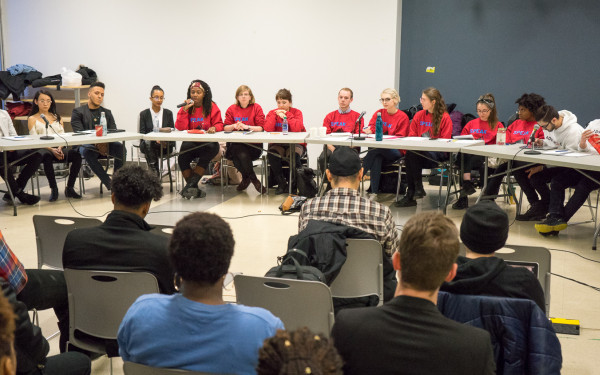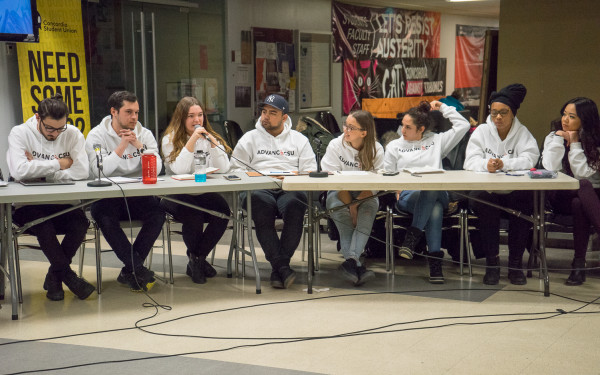Editorial: CSU Needs More Democracy, not Less
Conflict of Interest Proves That We Need Power in the Hands of the Many
In only the third week of school, General Coordinator Omar Riaz and Finance Coordinator Soulaymane El Alaoui were both accused of being in a conflict of interest by the CSU’s council.
The accusation stems from the two having accepted an offer to go to a conference for Canadian student unions at the University of British Columbia in Vancouver. Their trip was paid for by Lev Bukhman, the CEO of the CSU’s insurance provider, Alliance pour la Santé Étudiante au Québec. Council saw it as a conflict of interest, since the CSU renewed a contract for health and dental insurance with ASEQ last year.
Additionally, the pair had also attempted to file other expenses incurred from the trip, another $980, including almost $800 in car rentals, under the Health and Dental Plan Premiums budget line.
An offer for a similar trip was made last year by the same provider to the CSU, but was turned down. In reaction to that offer, council adopted a position stating that if executives are offered any benefits or gifts, the council will have final approval on whether those gifts can be accepted. In this case, no approval was sought by Riaz and El Alaoui before they accepted the sizeable gift, despite knowledge of this position—Riaz was on council when it was adopted.
It was also determined, at the time, that not having gifts approved could put an executive at risk of impeachment.
When Riaz and El Alaoui were reprimanded, things didn’t go that far. But the pair will have to issue a public apology, and have both been given formal warnings.
The allegations of conflict of interest are valid, and we at The Link take them seriously. Like all Concordia students should, we expect our elected representatives to represent our interests as a student body. Accepting gifts from a for-profit corporation that the CSU deals with points to their not doing so.
Beyond the highly problematic acceptance of gifts by Riaz and El Alaoui, the two also wrote a report about the conference they attended. In it, they recommended that the CSU become more hierarchical and centralized.
The CSU has spent the past years attempting to decentralize the power of its executive members. In 2015, titles of executives were changed from president and vice-presidents to general coordinator and coordinators. Last year, a referendum question passed which stripped the general coordinator of the power to pass motions by unilateral decree.
The Link supported both those motions then, and continues to support them today. Decentralized power is democratic, and we stand by the CSU’s efforts to continue to engage the student body in issues that matter to them, like how their money is spent. This can only be done by leaving the power in the hands of the many, not the few.
The recommendations of this report, however, appear to show that Riaz and El Alaoui would like to move in the opposite direction—towards eliminating executive positions and consolidating power in the hands of those that remain.
The Link stands in firm, unwavering opposition to the disingenuous attempts by these two CSU executives to centralize power in their own hands.
This behaviour is openly anti-democratic. Students have, in the past two years, repeatedly voted to decentralize power within the CSU. Because of how recent those referendums were, it is safe to assume that most voters are still Concordia students. Despite the expressed desire by their constituents to see distributed, rather than centralized, power, Riaz and El Alaoui seem to believe that they know best what students want and need.
The CSU is a large organization with millions of dollars in its bank account. The potential for corruption in this organization is very real, and has manifested itself on multiple occasions in the recent past. In many cases, this danger has only been mitigated by the democratic nature of the organization.
Ironically, Riaz and El Alaoui provided a clear-cut example of this dynamic in their handling of the costs associated with the conference. The gift that they received from ASEQ, and the illegitimate claims they made to the Health and Dental budget line, were clear violations of the CSU’s internal rules and regulations. They were held accountable by the CSU’s internal democracy—their council, in this case.
Other executives were quoted by The Link as saying that they felt uncomfortable with the decision by Riaz and El Alaoui to attend the conference, but felt they were not given the option to prevent it. This points to the fact that more democracy, not less, is required within the executive team.
This year’s executive team is, for the first time, comprised of members of more than one electoral slate. We hope that this experiment in multi-party power sharing becomes successful, and proves that collaboration is possible in the interests of the broader student body.
Unfortunately, things are off to a really rough start. We hope that this event is not a harbinger of things to come.


_600_832_s.png)



_600_375_90_s_c1.JPG)
